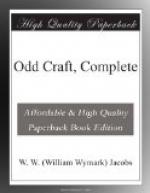“Not like this,” ses the conjurer. And ’e pulled out a woman’s dress and jacket and a pair o’ boots. Then ‘e took out a pound or two o’ taters and some crusts o’ bread and other things, and at last ’e gave it back to Sam Jones and shook ’is head at ’im, and told ’im if he wasn’t very careful he’d spoil the shape of it.
Then ’e asked somebody to lend ’im a watch, and, arter he ’ad promised to take the greatest care of it, Dicky Weed, the tailor, lent ’im a gold watch wot ’ad been left ’im by ’is great-aunt when she died. Dicky Weed thought a great deal o’ that watch, and when the conjurer took a flat-iron and began to smash it up into little bits it took three men to hold ’im down in ’is seat.
“This is the most difficult trick o’ the lot,” ses the conjurer, picking off a wheel wot ’ad stuck to the flat-iron. “Sometimes I can do it and sometimes I can’t. Last time I tried it it was a failure, and it cost me eighteenpence and a pint o’ beer afore the gentleman the watch ’ad belonged to was satisfied. I gave ’im the bits, too.”
“If you don’t give me my watch back safe and sound,” ses Dicky Weed, in a trembling voice, “it’ll cost you twenty pounds.”
“’Ow much?” ses the conjurer, with a start. “Well, I wish you’d told me that afore you lent it to me. Eighteenpence is my price.”
He stirred the broken bits up with ’is finger and shook his ’ead.
“I’ve never tried one o’ these old-fashioned watches afore,” he ses. “’Owever, if I fail, gentle-men, it’ll be the fust and only trick I’ve failed in to-night. You can’t expect everything to turn out right, but if I do fail this time, gentlemen, I’ll try it agin if anybody else’ll lend me another watch.”
Dicky Weed tried to speak but couldn’t, and ’e sat there, with ’is face pale, staring at the pieces of ’is watch on the conjurer’s table. Then the conjurer took a big pistol with a trumpet-shaped barrel out of ’is box, and arter putting in a charge o’ powder picked up the pieces o’ watch and rammed them in arter it. We could hear the broken bits grating agin the ramrod, and arter he ’ad loaded it ’e walked round and handed it to us to look at.
“It’s all right,” he ses to Dicky Weed; “it’s going to be a success; I could tell in the loading.”
He walked back to the other end of the room and held up the pistol.
“I shall now fire this pistol,” ’e ses, “and in so doing mend the watch. The explosion of the powder makes the bits o’ glass join together agin; in flying through the air the wheels go round and round collecting all the other parts, and the watch as good as new and ticking away its ‘ardest will be found in the coat-pocket o’ the gentleman I shoot at.”
He pointed the pistol fust at one and then at another, as if ’e couldn’t make up ’is mind, and none of ’em seemed to ’ave much liking for it. Peter Gubbins told ’im not to shoot at ’im because he ’ad a ’ole in his pocket, and Bill Chambers, when it pointed at ’im, up and told ’im to let somebody else ’ave a turn. The only one that didn’t flinch was Bob Pretty, the biggest poacher and the greatest rascal in Claybury. He’d been making fun o’ the tricks all along, saying out loud that he’d seen ’em all afore—and done better.




